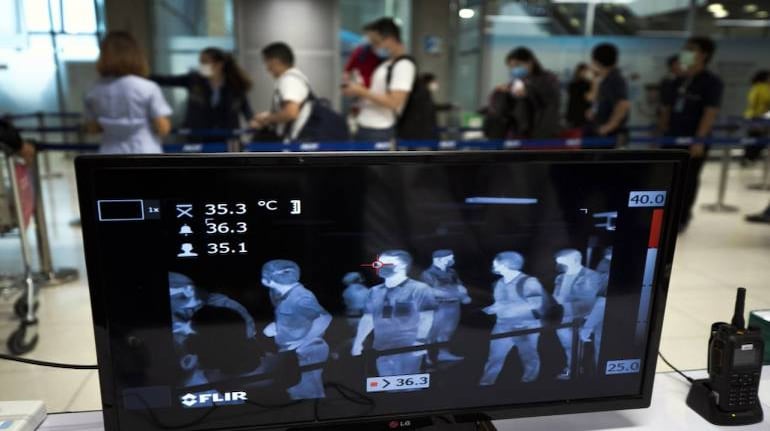



An Airbus 320 aircraft usually carries about 180 passengers. Earlier this week though, a budget carrier's A320 flight from Bengaluru to Mumbai had eight passengers.
Similarly, a full service airline's Boeing aircraft flew 14 passengers, including the crew.
Across airlines, several executives told Moneycontrol, the average load hovers around 30 percent. "It won't be far before airlines start flying ghost flights just to maintain slots at airports," said one of them. Airlines, according to regulations, have to maintain flight schedules to keep their slots.
On the ground, even as staff on the ticket counters wait for passengers - who are few - conversations are around the crisis and how it could impact them. Everyone is hoping against hopes and expecting to avoid the fate of their counterparts at Jet Airways, which suspended operations in April 2019.
At GoAir, the axe has already come. The airline has terminated the contract of its expat pilots. The company has also sent some of its employees - as much as 35 percent as per sources - on leave without pay.
At IndiGo, CEO Ronojot Dutta has announced a pay cut, starting with himself. A day before Dutta's mail, pilots were informed about the "necessity to initiate some tough calls," and that the company was working on "a string of measures” to be shared and implemented over the next few days and weeks.
The letter from the vice president said, "The economic environment has deteriorated significantly and no airline is insulated from this severe downturn."
The circumstances have changed dramatically in the industry.
"Just two weeks ago, we were being asked if we wanted to surrender our leave to do extra hours. Now we are having pay cuts, leave without pay, and now face the possibility of losing our jobs," says a senior pilot.
The collapse
The industry's collapse has been swift.
A report by industry advisory CAPA India, released on March 18, says that airline yields started deteriorating in February, initially by 5-10 percent year-on-year (YoY). By mid-March, the decline was about 15 percent. Advance bookings are already down over 30 percent.
The rest of the travel industry is already reeling under the impact. A travel agent in Mumbai earlier told Moneycontrol that it had been three weeks since a client booked tickets from him.
The coming days and weeks will see the effects of the demand slump playing out. In its report, CAPA India further said more than 150 aircraft could be grounded, and a huge chunk of the workforce - 30 percent of an airline and 50 percent of ground handling - could go redundant.
There is little that the airlines themselves can do. The government, in a bid to limit the spread of the virus, has restricted international travel. The traffic to and from Europe and the Middle East - two crucial markets - has come to a standstill.
The airlines have cut down on flights. GoAir and Vistara have suspended international operations. IndiGo and Air India have also truncated flights to overseas destinations.
In the domestic market too, similar steps have been taken.
Counter steps
Airlines in India just have to look at their counterparts in other international markets to know what is coming.
UK budget carrier Flybe has collapsed, LATAM Airlines - South America's largest - has canceled 90 percent of its flights and American major Delta Air Lines has grounded 600 planes, about 70 percent of its fleet.
"Airlines in India will be forced to do the same," said an industry veteran.
Vistara, SpiceJet and GoAir have suspended much, or all, of their international operations. Air India and IndiGo, too, have truncated their overseas services. In the domestic market too, networks have been rationalised.
While these will reduce operating expenses, the airlines will look for more ways to cut expenses. One could be on training expenses.
Many of the international airlines, including Emirates, have suspended simulator and class room training. In India, airlines could do the same. And, that has made many more worried.
"I have been waiting for a few months now to start flying. But, it has not happened, and now I fear the worst," says a pilot who has completed the training.
A senior pilot, who left Jet Airways to join a competition, is relieved that his training is over, and he is now flying again. "I am glad I am on the roster now. Those who are still training could be in danger of losing jobs," the pilot added.
Airlines usually suspend training and cancel recruitments temporarily until the situation improves. This would mean those hoping to start flying will have to wait out and lose out on salaries.
The waiting and the wondering is laced with fear.
Discover the latest Business News, Sensex, and Nifty updates. Obtain Personal Finance insights, tax queries, and expert opinions on Moneycontrol or download the Moneycontrol App to stay updated!
Find the best of Al News in one place, specially curated for you every weekend.
Stay on top of the latest tech trends and biggest startup news.